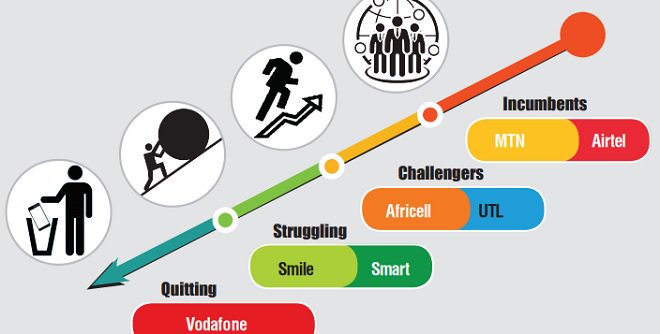
Bigger firms choke smaller and new telcos
Kampala, Uganda | JULIUS BUSINGE | A few days to implementation of the social media tax, commonly referred to as Over the Top (OTT) on July 1, 2018, three largest telecom firms – MTN, Airtel and Africell issued a joint statement to guide its customers on how to pay the levy.
The statement that carried a rather plain message signaled the changing dynamics in the telecom sector that had seven telecom firms prior to the recent exit of Vodafone Uganda Limited.
Vodafone, which started operations in 2015, was the latest entrant in the country’s telecom industry.
Other telecoms such as Smart, owned by the Aga Khan Development Network (AKDN) and Smile Telecom, were forced to drop voice service to concentrate on data.
K2 on the other hand, which launched operations in 2012, has been closed twice over tax arrears. On July 27, it announced that it had signed a brand endorsement agreement with Airtel where its customers would access all telecommunication services on the latter’s infrastructure.
The government owned Uganda Telecom, and one of the oldest telecom firms in the country, is currently under statutory management and continues to grapple with old infrastructure and the hustle of finding investors to jump-start its operations.
This scenario has reignited debate on the future of the sector that seems to be slowly going into the hands of a few players. This, to some analysts could easily see these players form cartels – which would distort the market.
In addition, the disappearance of small players means less competition in the sector, loss of jobs and related economic opportunities.
The Independent sought views from sector experts, telecom firms and the regulator in regards to the current fears and likely future performance of the sector.
“In the beginning the market was all about voice, it is now data and next it might be services,” Badru Ntege, the chairman of the East African Science and Technology Commission (EASTECO) and group CEO of consultancy firm, NFT told The Independent on August 07.
He said the legal regime that allows incumbents (Airtel and MTN) to rent out infrastructure only enriches big players and makes small ones uncompetitive.
But Godfrey Mutabazi, the executive director at Uganda Communications Commission (UCC), the regulator, told The Independent on August 06 that failure of small players in the market is not because of the current legal regime.
First, he said, Uganda is a liberalised economy and that the sector has terms and conditions before a company is licensed to offer services.
He said most small players entered the country’s telecom market at a time when the big players, which he referred to as incumbents, had moved on, invested a lot in infrastructure and captured many customers thus making it difficult for new players to snatch some from them.
Mutabazi said some players like Africell have survived because they bought an already existing player and have tried to establish its niche market – data.
With regard to possibilities of the big three firms forming a cartel, Mutabazi said: “The law is clear. We do a lot of studies to ensure there is fair competition; we have systems in place to monitor each and every transaction taking place in telecom companies.”
K2, Airtel partnership
The Buganda Kingdom-owned telecom firm prior to its problems last year and some parts of this year had close to 100,000 customers but had failed to break-even.
Officials at the two firms (Airtel and K2) said K2 customers would buy lines and use the 0708 code instead of the old 0730 and that they would be registered as K2 customers.
The firms will share revenue accruing from the transactions, Godfrey Kisekka, K2’s chief executive officer said.
V.G Somashekar, the managing director of Airtel told The Independent in an email response that the partnership reflects Airtel’s commitment to Uganda and its willingness to invest more.
“This one is respect for relationship; collaboration with competitors and finding meaningful and purposeful partnerships creating win-win solutions,” Somashekar said.
He said the Airtel-K2 partnership is not a takeover but a ‘brand endorsement deal.’
 The Independent Uganda: You get the Truth we Pay the Price
The Independent Uganda: You get the Truth we Pay the Price



